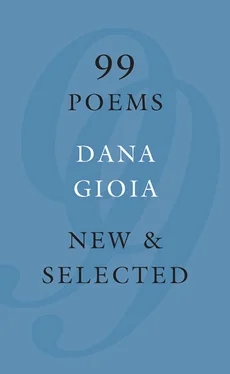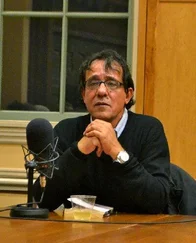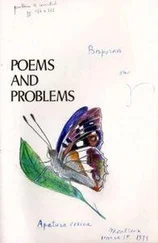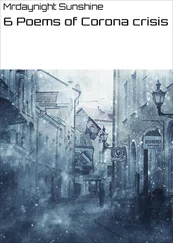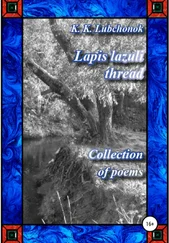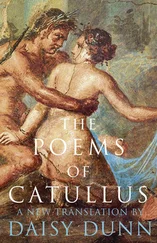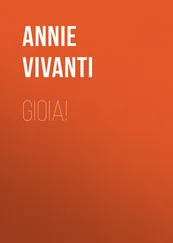Abandoned to the ragged crow’s parade.
The flags unravel in the caterpillar’s feast.
The wreaths collapse onto the stones they shade.
How quietly doves gather by the gate
Like souls who have no heaven and no hell.
The patient grass reclaims its lost estate
Where one stone angel stands as sentinel.
The voices whispering in the burning leaves,
Faint and inhuman, what can they desire
When every season feeds upon the past,
And summer’s green ignites the autumn’s fire?
The afternoon’s a single thread of light
Sewn through the tatters of a leafless willow,
As one by one the branches fade from sight,
And time curls up like paper turning yellow.
How shall I hold my soul that it
does not touch yours? How shall I lift
it over you to other things?
If it would only sink below
into the dark like some lost thing
or slumber in some quiet place
which did not echo your soft heart’s beat.
But all that ever touched us — you and me—
touched us together
like a bow
that from two strings could draw one voice.
On what instrument were we strung?
And to what player did we sing
our interrupted song?
(After the German of Rainer Maria Rilke)
Storm on storm, snow on drifting snowfall,
shifting its shape, flurrying in moonlight,
bright and ubiquitous,
profligate March squanders its wealth.
The world is annihilated and remade
with only us as witnesses.
Briefest of joys, our life together,
this brittle flower twisting toward the light
even as it dies, no more permanent
for being perfect. Time will melt away
triumphant winter, and even your touch
prove the unpossessable jewel of ice.
And vanish like this unseasonable storm
drifting there beyond the windows where even
the cluttered rooftops now lie soft and luminous
like a storybook view of paradise.
Why not believe these suave messengers
of starlight? Morning will make
their brightness blinding, and the noon insist
that only legend saves the beautiful. But if
the light confides how one still winter must
arrive without us, then our eternity
is only this white storm, the whisper
of your breath, the deities of this quiet night.
All afternoon my brothers and I have worked in the orchard,
Digging this hole, laying you into it, carefully packing the soil.
Rain blackened the horizon, but cold winds kept it over the Pacific,
And the sky above us stayed the dull gray
Of an old year coming to an end.
In Sicily a father plants a tree to celebrate his first son’s birth—
An olive or a fig tree — a sign that the earth has one more life to bear.
I would have done the same, proudly laying new stock into my father’s orchard,
A green sapling rising among the twisted apple boughs,
A promise of new fruit in other autumns.
But today we kneel in the cold planting you, our native giant,
Defying the practical custom of our fathers,
Wrapping in your roots a lock of hair, a piece of an infant’s birth cord,
All that remains above earth of a first-born son,
A few stray atoms brought back to the elements.
We will give you what we can — our labor and our soil,
Water drawn from the earth when the skies fail,
Nights scented with the ocean fog, days softened by the circuit of bees.
We plant you in the corner of the grove, bathed in western light,
A slender shoot against the sunset.
And when our family is no more, all of his unborn brothers dead,
Every niece and nephew scattered, the house torn down,
His mother’s beauty ashes in the air,
I want you to stand among strangers, all young and ephemeral to you,
Silently keeping the secret of your birth.
There were a few, the old ones promised us,
Who could escape. A few who once, when trapped
At the extremes of violence, reached out
Beyond the rapist’s hand or sudden blade.
Their fingers branched and blossomed. Or they leapt
Unthinking from the heavy earth to fly
With voices — ever softer — that became
The admonitions of the nightingale.
They proved, like cornered Daphne twisting free,
There were a few whom even the great gods
Could not destroy.
And you, my gentle ghost,
Did you break free before the cold hand clutched?
Did you escape into the lucid air
Or burrow secretly among the dark
Expectant roots, to rise again with them
As the unknown companion of our spring?
I’ll never know, my changeling, where you’ve gone,
And so I’ll praise you — flower, bird, and tree—
My nightingale awake among the thorns,
My laurel tree that marks a god’s defeat,
My blossom bending on the water’s edge,
Forever lost within your inward gaze.
After the death of our son
Neither the sorrows of afternoon, waiting in the silent house,
Nor the night no sleep relieves, when memory
Repeats its prosecution.
Nor the morning’s ache for dream’s illusion, nor any prayers
Improvised to an unknowable god
Can extinguish the flame.
We are not as we were. Death has been our pentecost,
And our innocence consumed by these implacable
Tongues of fire.
Comfort me with stones. Quench my thirst with sand.
I offer you this scarred and guilty hand
Until others mix our ashes.
This is a litany of lost things,
a canon of possessions dispossessed,
a photograph, an old address, a key.
It is a list of words to memorize
or to forget — of amo, amas, amat ,
the conjugations of a dead tongue
in which the final sentence has been spoken.
This is the liturgy of rain,
falling on mountain, field, and ocean—
indifferent, anonymous, complete—
of water infinitesimally slow,
sifting through rock, pooling in darkness,
gathering in springs, then rising without our agency,
only to dissolve in mist or cloud or dew.
This is a prayer to unbelief,
to candles guttering and darkness undivided,
to incense drifting into emptiness.
It is the smile of a stone Madonna
and the silent fury of the consecrated wine,
a benediction on the death of a young god,
brave and beautiful, rotting on a tree.
This is a litany to earth and ashes,
to the dust of roads and vacant rooms,
to the fine silt circling in a shaft of sun,
settling indifferently on books and beds.
This is a prayer to praise what we become,
“Dust thou art, to dust thou shalt return.”
Savor its taste — the bitterness of earth and ashes.
This is a prayer, inchoate and unfinished,
for you, my love, my loss, my lesion,
a rosary of words to count out time’s
illusions, all the minutes, hours, days
the calendar compounds as if the past
existed somewhere — like an inheritance
still waiting to be claimed.
Until at last it is our litany, mon vieux ,
my reader, my voyeur, as if the mist
steaming from the gorge, this pure paradox,
the shattered river rising as it falls—
splintering the light, swirling it skyward,
neither transparent nor opaque but luminous,
even as it vanishes — were not our life.
Читать дальше
